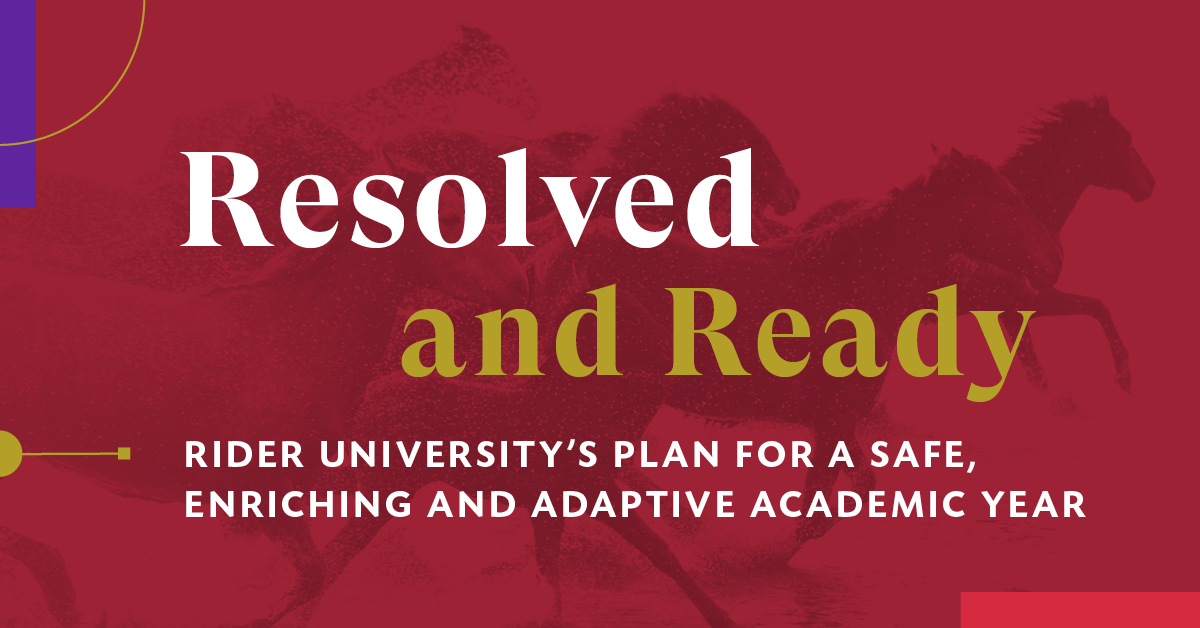Wednesday, Jun 24, 2020
Flexible plan includes hybrid model, with students permitted to live on campus
by Adam Grybowski
Rider University announced on June 24 a comprehensive plan to guide the reopening of campus for the fall semester.
The resumption of campus operations in the fall 2020 semester will include modified modes of academic instruction, changes to the fall academic calendar, and altered staffing and workplace scenarios. Students will be permitted to live on campus.
Called “Resolved and Ready,” the plan, along with a companion website at rider.edu/resolved-and-ready, provides guidance on ensuring the highest level of academic instruction while also protecting the health and safety of Rider’s campus community.
“The past few months have presented an array of challenges and created a climate of uncertainty in our daily lives,” said President Gregory G. Dell’Omo and Kelly Bidle, dean of Rider’s College of Liberal Arts and Sciences, in a letter to the campus community announcing the plan. “Resolved and Ready speaks to the agility we all must embrace in order to maintain a safe and vibrant learning environment for the fall.”
Bidle chaired the Fall 2020 Planning Task Force, which was formed in May to evaluate and recommend a comprehensive plan to address the myriad of issues and challenges posed by the coronavirus pandemic. Approximately 70 administrators, faculty, staff and students serving on working groups were dedicated to five key areas of campus operations: academics, facilities and public health, student experience, legal considerations, and finance and enrollment.
The fall semester will begin on Aug. 31, one week earlier than originally scheduled. On-ground instruction will cease on Nov. 24, with residential students moving out of residence halls prior to Thanksgiving break. One week of remote instruction will follow Thanksgiving break to maintain a required 13-week semester.
"These modifications will allow more instructional time during the warmer months, prior to the start of the anticipated flu season in the colder months," Bidle says.
Fall classes will be delivered in three primary formats: fully remote, fully in person and a hybrid model that blends these two options. These modalities will be listed on the Enhanced Course Roster Schedule of Classes for Fall to clearly provide students with the type of instruction to expect in each of their individual courses. Students who have already registered for the fall semester will have the opportunity to adjust their previous schedules to best suit their preferences.
All in-person courses (whether fully in person or a hybrid) will occur in classrooms and spaces that have been properly reorganized to accommodate proper physical distancing.
“We have a shared responsibility in maintaining a learning environment that is both enriching and safe,” says Bidle. “These modifications present a way forward that allows us to achieve both as we continue to learn how to coexist with the coronavirus.”
A series of health practices and protocols will be instituted for the fall semester, along with enhanced sanitation efforts. Seating in classrooms will be altered to allow for greater distance between the instructor and students. Campus eating establishments will be set up to allow for social distancing. As room assignments are confirmed throughout the summer months, the Office of Residence Life will identify all vacancies and maximize access to single rooms.
The University will stock face masks, hand sanitizer and disinfecting wipes and will make these widely available to all members of the campus community.
The University is also developing protocols for contact tracing and seeking guidance on the appropriate use of testing and expectations for the campus community to perform self-monitoring for COVID-19 symptoms, including temperature checks. All students, faculty and staff will receive training for identifying COVID-19 symptoms, reporting of positive tests and/or exposure, and expected personal hygiene behaviors while on campus.
Staff who are able to continue effectively working remotely will likely continue to do so, with decisions made at the department or division level. If restrictions are lifted, allowing on-site work to resume, the University has recommendations in place to maintain social distancing requirements and mitigate the potential spread of the virus. Likewise, safe classroom spaces are being prepared that adhere to current state and CDC guidelines.
The plan, which adheres to all federal, state and local guidelines, acknowledges that all policies and recommendations may be updated as appropriate as knowledge and understanding of the COVID-19 virus continue to evolve and new information becomes available.
"The plan provides a framework that incorporates the best practices and recommendations that exist in higher education," says Dell'Omo. "Every dimension of the Rider experience will be affected by it. And importantly, it alone won't ensure success. Achieving success is going to take the commitment and persistence of every individual working together in a spirit of resolution and flexibility. While the challenges are daunting, through cooperation our best efforts can overcome them."

